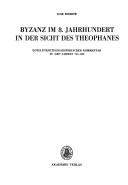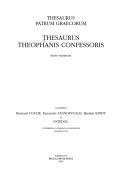| Listing 1 - 5 of 5 |
Sort by
|
Book
ISSN: 05771471 ISBN: 9782916716589 2916716580 Year: 2015 Volume: 19 Publisher: Paris: Association des amis du Centre d'histoire et civilisation de Byzance,
Abstract | Keywords | Export | Availability | Bookmark
 Loading...
Loading...Choose an application
- Reference Manager
- EndNote
- RefWorks (Direct export to RefWorks)
This book presents the proceedings of the conference “The Chronicle of Theophanes : sources, composition, transmission,” organized by the editors in Paris in September 2012. The first section of the volume is devoted to the question of the authorship of the Chronicle, raised by C. Mango almost forty years ago. The second section is devoted to issues of transmission, both direct (manuscript tradition) and indirect (readership, translations). The third section concerns Theophanes’ sources for early Byzantine history. A separate section hosts papers by some of the major actors in the current debate on Theophanes’ Eastern source. The last section of the book deals with the later part of the Chronicle and with its sources.
Theophanes, --- Congresses. --- Chronographia (Theophanes, the Confessor) --- Byzantine Empire --- Empire byzantin --- History --- Historiography. --- Historiography --- Histoire --- Historiographie --- Theofanes Confessor, --- Chronographia (Theophanes, the Confessor). --- Theophanes conf. Sigrianae chronographus

ISBN: 3050007001 9783050007007 Year: 1991 Volume: 57 Publisher: Berlin: Akademie,
Abstract | Keywords | Export | Availability | Bookmark
 Loading...
Loading...Choose an application
- Reference Manager
- EndNote
- RefWorks (Direct export to RefWorks)
Theophanes, --- Byzantine Empire --- Empire byzantin --- History --- Sources --- Histoire --- Theophanes the Confessor --- -Sources --- -History --- -Theophanes the Confessor --- -Theophanes, --- -Byzantium (Empire) --- Vizantii︠a︡ --- Bajo Imperio --- Bizancjum --- Byzantinē Autokratoria --- Vyzantinon Kratos --- Vyzantinē Autokratoria --- Impero bizantino --- Bizantia --- Sources. --- Byzantium (Empire) --- Theophanes, - the Confessor, - -approximately 818 - Chronographia - Sources --- Byzantine Empire - History - Isaurian dynasty, 717-811 - Sources --- Theophanes, - the Confessor, - -approximately 818 - Chronographia

ISBN: 2503510787 9782503510781 Year: 2000 Volume: *16 Publisher: Turnhout: Brepols,
Abstract | Keywords | Export | Availability | Bookmark
 Loading...
Loading...Choose an application
- Reference Manager
- EndNote
- RefWorks (Direct export to RefWorks)
Greek language, Medieval and late --- Grec byzantin (Langue) --- Glossaries, vocabularies, etc. --- Glossaires, vocabulaires, etc. --- Theophanes, --- Language --- Word frequency. --- Early Christian Literature --- Greek language, Medieval and late - Glossaries, vocabularies, etc --- Theophanes, - the Confessor, - -approximately 818 - Chronographia - Indexes --- Theophanes, - the Confessor, - -approximately 818 - Language --- Theophanes, - the Confessor, - -approximately 818 - Chronographia --- Theophanes, - the Confessor, - -approximately 818
Book
ISBN: 9782874570667 2874570664 Year: 2013 Volume: 5 Publisher: Bruxelles: Safran,
Abstract | Keywords | Export | Availability | Bookmark
 Loading...
Loading...Choose an application
- Reference Manager
- EndNote
- RefWorks (Direct export to RefWorks)
Personne ne peut prétendre connaître Byzance ou son histoire et ignorer la Chronique de Théophane. Cet ouvrage constitue pour l’historiographie byzantine le point de passage d’un temps historique « avant Théophane » à un temps « après Théophane ». Sa popularité est en outre manifeste du fait qu’elle servait de livre scolaire, même pour les princes, pour l’apprentissage de l’Histoire. Le fait qu’Anastase le Bibliothécaire l’a choisi pour le traduire en latin, est la preuve irréfutable de l’autorité scientifique de la Chronique dans le monde occidental. Or, il faut être un spécialiste pour apprécier le débat acharné autour du rôle de Théophane à la composition de cet ouvrage transmis sous son nom. Cette question, qui tourmente la recherche historique depuis de Xe siècle, ne peut toutefois pas être dissociée de l’étude de la personnalité, toujours énigmatique, de Théophane. Qui était alors Théophane ? Qui était cet homme, né dans un milieu iconoclaste, qui a terminé sa vie comme confesseur de la cause des icônes ? Cet homme, né dans l’opulence, qui après un mariage de raison, prit l’habit monastique et passa sa vie comme un humble moine ? Comment, de cet homme ordinaire, le parti iconophile a créé un héros de la cause des icônes ? Et pourquoi, au Xe siècle Constantin, VII le Porphyrogénète et la propagande du Palais ont voulu propager la légende de Théophane ancêtre impérial et saint officiel de la cour ?
Beeldenstorm en beeldenstrijd --- Beeldenstrijd -- Geschiedenis --- Beeldenstrijd en beeldenstorm --- Iconoclasm --- Iconoclasm -- History --- Iconoclasme --- Iconoclasme -- Histoire --- Iconoclasme et iconoclastie --- Iconoclastie et iconoclasme --- Images [Querelle des ] --- Querelle des Images --- Theophanes, --- History and criticism --- Byzantine Empire --- History --- Theophanes the Confessor --- Theophanes continuatus --- Sources --- Theophanes conf. Sigrianae chronographus --- Theophanes, - the Confessor, - -approximately 818 --- Theophanes, - the Confessor, - -approximately 818 - Chronographia - History and criticism --- Byzantine Empire - History - Isaurian dynasty, 717-811 - Sources --- Theophanes, - the Confessor, - -approximately 818 - Chronographia
Book
ISBN: 9789004501690 900450169X 9004516859 9789004516854 Year: 2022 Publisher: Leiden ;Boston Brill
Abstract | Keywords | Export | Availability | Bookmark
 Loading...
Loading...Choose an application
- Reference Manager
- EndNote
- RefWorks (Direct export to RefWorks)
The ninth-century Chronographia of George the Synkellos and Theophanes is the most influential historical text ever written in medieval Constantinople. Yet modern historians have never explained its popularity and power. This interdisciplinary study draws on new manuscript evidence to finally animate the Chronographia’s promise to show attentive readers the present meaning of the past. Begun by one of the Roman emperor’s most trusted and powerful officials in order to justify a failed revolt, the project became a shockingly ambitious re-writing of time itself—a synthesis of contemporary history, philosophy, and religious practice into a politicized retelling of the human story. Even through radical upheavals of the Byzantine political landscape, the Chronographia’s unique historical vision again and again compelled new readers to chase after the elusive Ends of Time.
History, Ancient --- Historiography --- Histoire ancienne --- Historiography. --- Historiographie. --- Geōrgios, --- Theophanes, --- Chronographia (Theophanes, the Confessor) --- Ecloga chronographica (Geōrgios, Synkellos) --- Byzantine Empire --- Byzantine Empire. --- History --- Chronology. --- Historical criticism --- Authorship --- Criticism --- History.
| Listing 1 - 5 of 5 |
Sort by
|

 Search
Search Feedback
Feedback About UniCat
About UniCat  Help
Help News
News